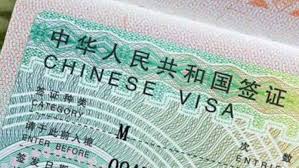Islamabad, Apr 16, 2025: In 2025, China has granted more than 85,000 visas to Indian citizens, showcasing a significant increase from the previous year.
This development occurs amid escalating trade tensions between Beijing and Washington.
The Chinese Embassy in India reported that from January 1 to April 9, 2025, over 8,500 visas were issued to Indian nationals.
Xu Feihong, the Chinese Ambassador to India, expressed his optimism that more Indians would visit China to experience its “welcoming, secure, and hospitable atmosphere.”
Xu took to X, the social media platform, to announce the figures, stating, “As of April 9, 2025, the Chinese Embassy and Consulates in India have issued more than 85,000 visas to Indian citizens traveling to China this year. We invite more Indian friends to explore a vibrant, warm, and friendly China.”
This surge in visa issuance marks a shift from previous years.
In 2023, only 180,000 visas were issued, whereas the new data shows a remarkable rise, with 85,000 granted in just the first four months of 2025.
This increase is part of China’s broader strategy to strengthen cultural and people-to-people relations with India, in line with its diplomatic goals.
The upsurge follows changes in visa regulations that the Chinese Embassy in India implemented in late 2023.
Notably, Indian applicants no longer need to schedule online appointments before submitting their visa applications, as they can now submit them directly at the visa centers during working hours.
Moreover, applicants seeking short-term, single or double-entry visas for stays under 180 days are exempt from providing biometric data, including fingerprints.
China has also reduced visa application fees, introducing more affordable rates for applicants.
These adjustments reflect China’s desire to encourage greater engagement with Indian citizens and facilitate increased bilateral exchange.
However, amid rising tensions with the United States, this diplomatic move aligns with Beijing’s broader strategy.
President Donald Trump has been vocal about imposing heavy tariffs on Chinese imports, increasing tariffs on Chinese goods to 145 percent.
Read More: New US Visa Policies for H-1B and Green Card Holders
In response, China has imposed a 125 percent tariff on American products. Against the backdrop of this trade conflict, Beijing has urged India and other nations to take a firm stand against what it terms “US tariff abuse.”
Although, Yu Jing, a spokesperson for the Chinese Embassy in India, recently stated that China and India, as the two largest developing nations, should unite against US tariff policies.
“China-India economic and trade relations are based on complementarity and mutual benefit.
In light of US tariff abuses, these two major developing countries should unite to confront these challenges,” Yu commented on X.
This statement highlights China’s increasing diplomatic engagement with India, emphasizing the need for collaboration in resisting US-led economic pressures.
As the global political and economic landscape evolves, nations are increasingly seeking strategic alliances in response to US policies.









